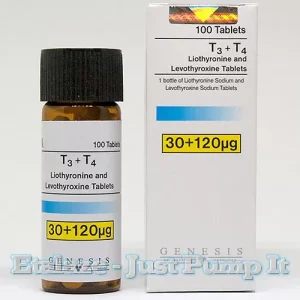T3 Application in Building Muscle Mass
Bodybuilders sometimes use T3 (triiodothyronine) to enhance their metabolism and aid in fat loss. T3 is not a steroid but a thyroid hormone produced by the thyroid gland. Its primary function in the body is to regulate metabolism. But, how much do you know about T3 application.
Let’s delve into the details of T3 (triiodothyronine):
T3 Application (Major Role in Bodybuilding)
T3, also known as triiodothyronine, is one of the two primary thyroid hormones produced by the thyroid gland. The other hormone is T4 (thyroxine).
T3 is more biologically active than T4 and plays a crucial role in regulating metabolism, energy production, and overall cellular function.
Related: Dosing Of Oral Turinabol For Men
Metabolism and Fat Loss
-
- T3 directly affects the metabolic rate by influencing the activity of various enzymes involved in energy production.
- When T3 levels are optimal, it increases the basal metabolic rate (BMR), leading to higher calorie expenditure even at rest.
- Bodybuilders sometimes use T3 to accelerate fat loss by increasing energy expenditure and promoting lipolysis (breakdown of stored fat).
Why Bodybuilders Incorporate T3
-
- Some bodybuilders incorporate T3 into their cutting cycles (phases where they aim to reduce body fat) to enhance fat loss.
- However, T3 usage requires caution due to potential side effects and risks.
Side Effects and Considerations
-
- T3 supplementation can suppress the body’s natural production of thyroid hormones, leading to hypothyroidism.
- Side effects may include heart palpitations, nervousness, muscle weakness, and changes in appetite.
Cycling T3 (using it for specific periods) and gradually tapering the dosage can help mitigate risks.


Dosage and Frequency
When it comes to T3 (triiodothyronine) dosage for bodybuilders, here’s what you need to know:
Typical Dosage
Bodybuilders and athletes often run T3 cycles to enhance fat loss during contest preparation or photoshoots.
The typical peak dose for male bodybuilders ranges from 75 to 100 mcg per day.
Some individuals may venture as high as 125 mcg, but this is on the high end and not commonly recommended.
Starting Dosage for T3 Application
If using tablets or liquid forms, competitors usually start with 12.5 mcg and gradually increase by 12.5 mcg every 3 days until reaching 50 mcg.
How to Mitigate T3 Application Side Effects
Gradual Titration: Start with a low dose and gradually increase it. This allows the body to adjust and minimizes the risk of sudden metabolic shifts and side effects. Typical starting doses might be around 25 mcg per day, with gradual increases based on individual response and tolerance.
Cyclic Use: To prevent thyroid suppression, some bodybuilders cycle their T3 usage. For example, they might use it for a few weeks, followed by a period off the drug to allow the thyroid gland to recover. Common cycles might involve 6-8 weeks on T3 followed by a similar period off.
Monitoring: Regular monitoring of thyroid function through blood tests can help ensure that the thyroid gland is not being overly suppressed and can recover normal function after T3 use is discontinued.
Moderate Dosages: Staying within moderate dosage ranges (typically not exceeding 50-75 mcg per day) helps minimize the risk of side effects such as heart palpitations, anxiety, excessive sweating, and muscle loss.
Combining with Anabolic Steroids: Using T3 in combination with anabolic steroids can help mitigate muscle loss due to its catabolic effects, as steroids promote muscle retention and growth.
Medical Supervision: Given the potential for significant side effects and long-term impacts on thyroid function, it's crucial that T3 use is overseen by a healthcare professional.
Individual Response: People respond differently to T3, so it's important to adjust the dosage based on individual tolerance and metabolic response.
Diet and Training: Effective use of T3 should be accompanied by a well-planned diet and training regimen to maximize its benefits and minimize adverse effects.
T3 (triiodothyronine) primarily influences metabolism and fat loss, but its direct impact on muscle growth is limited. Here’s why.
Important Notes:
Metabolism and Energy Expenditure
T3 increases the basal metabolic rate (BMR), leading to higher calorie expenditure.
While this can indirectly support muscle growth by providing energy for workouts, it doesn’t directly stimulate muscle protein synthesis.
Anabolic vs. Catabolic Effects
T3 doesn’t have significant anabolic (muscle-building) properties.
In fact, excessive T3 levels can be catabolic, breaking down muscle tissue.
Must Read: Most Common Nutrition Plan Among Famous BodyBuilders?
Balancing Act
Optimal thyroid function (including T3 levels) is essential for overall health.
Extreme fluctuations (too high or too low) can hinder muscle gains.
Focus on Other Factors
To promote muscle growth, prioritize proper nutrition, resistance training, and adequate rest.
Hormones like testosterone and growth hormone play more direct roles in muscle development.
T3 supplementation should be approached cautiously, and consulting a healthcare professional is crucial. For muscle growth, focus on a holistic approach rather than relying solely on T3.
T3 Alternatives
Anabolic Steroids
Example: Testosterone
Function: Testosterone is a natural anabolic steroid produced in the body.
Role in Muscle Growth
Increases protein synthesis, leading to muscle repair and growth.
Enhances nitrogen retention, crucial for muscle building.
Improves recovery between workouts.
Cautions
Potential side effects include acne, hair loss, and mood changes.
Requires medical supervision.
Usage: Bodybuilders often use testosterone-based compounds like testosterone enanthate or testosterone cypionate.
Selective Androgen Receptor Modulators (SARMs)
Example: Ostarine (MK-2866)
Function: Ostarine selectively binds to androgen receptors in muscle tissue.
Role in Muscle Growth
Promotes muscle protein synthesis without significant androgenic effects.
Helps preserve lean mass during calorie deficits.
Cautions
Mild side effects, if any.
Still under research; long-term safety not fully established.
Usage: Used during cutting or recomp phases.
Prohormones
Example: DHEA (Dehydroepiandrosterone)
Function: DHEA is a precursor to testosterone.
Role in Muscle Growth
Converts to testosterone in the body, supporting muscle development.
Enhances recovery and strength.
Cautions
Individual responses vary.
Consultation with a healthcare provider is essential.
Usage: Used as a natural alternative to synthetic steroids.
Individual goals, health status, and preferences play a significant role in choosing the right approach. Always prioritize safety and consult professionals when considering any supplementation.
T3 Application Overall
Bodybuilders are increasingly using T3 (triiodothyronine) not directly to build muscle mass but to optimize their body composition by enhancing fat loss while preserving muscle mass.
While T3 application is primarily for its fat-loss benefits, careful dosing, cycling, and monitoring can help mitigate the potential side effects and preserve muscle mass during its use.
Don't Miss: Top 10 Legal Steroids Products And Brands On The Market
